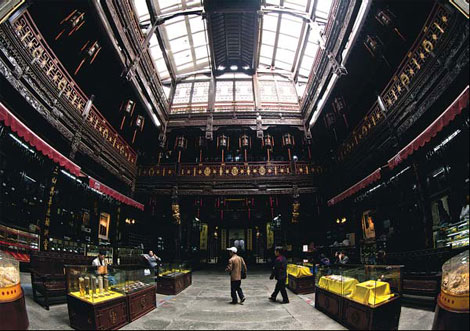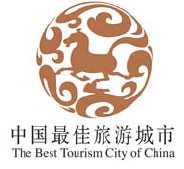|

Hu Qing Yu Tang, a historic herbal pharmacy founded during the late Qing Dynasty (1644-1911), is still operating today, and has even become a popular tourist destination in Hangzhou. Jiang Nan / For China Daily
|
Herbal pharmacies and massage popular with both tourists and locals
More than 100 years after its founding, a traditional pharmacy still benefits people in the scenic city of Hangzhou as its principles are passed down and remain in vogue among Chinese people.
It is difficult not to notice four huge Chinese characters on a white wall along 95 Dajingxiang off of Hangzhou's popular Hefangjie tourist street.
Tourists are likely curious about what is behind the 5-meter-tall brush-style Chinese characters that say Hu Qing Yu Tang - or Hu's Qing Yu Medicine Store - but most locals already know it as an imposing residence made of gray tiles and bricks.
Although it looks like one of South China's famous garden homes, the old mansion is actually a traditional Chinese pharmacy that has stood at the same site since 1874.
A stone tablet at the imposing entrance gives a clue to its origins. The pharmacy was founded by Hu Xueyan, arguably China's richest merchant, who was also an important court official in the late Qing Dynasty (1644-1911).

A widespread story about how it all began says Hu bought herbal medicine for his mother, only to find the medicine had gone bad with mildew.
He became so angry that he decided to establish a pharmacy himself. Ten years later, his pharmacy Qing Yu Tang, with his name Hu at the front, became the most influential in Hangzhou. He was dubbed "king of herbal medicine" south of the Yangtze River.
The pharmacy has kept the appearance it had 137 years ago. The main structure is built in courtyard style with two-floor wooden buildings typical of traditional Anhui architecture.
It has beautiful, sophisticated wooden framework, traditional wooden patterns and auspicious carved animals lacquered in gold decorating the top of huge wooden columns.
Visitors continue to be impressed by its architecture and historic feel. The main hall, which serves as both herbal medicine store and reception room, is magnificent and includes pictures of its founder on one wall.
Customers are treated to free cups of herbal tea as they wait for their medicine to be collected from the many small wooden drawers and packed neatly in paper. Nobody looks bored - they have plenty to admire.
Big wooden tablets hanging on a beam show the logo of the shop and let out some of the secrets of its success. One says "medicine is a merciful skill". Another reminds that there is "no discount for authentic medicines".
Hu himself vowed to abstain from cheating, especially because he was dealing in medicine. He also spent a lot on charity, giving out free medicines in times of war.
Cultural heritage
According to the store's assistant manager Sun Tie, it is the best preserved of the shops built during the Qing Dynasty. Its significance in South China is equivalent to Beijing's famed Tong Ren Tang store in North China.
It is now a national level protected cultural relic. In 2006, "Hu Qing Yu Tang Chinese medicine culture" was included on the list of national intangible cultural heritage.
"It is the most beautiful herbal medicine store in the country," Sun says. "It is also the city's business card for tourism."
Like other herbal stores of its time, Hu Qing Yu Tang had a shop at the front and a workshop in the rear. The front remains a shop today, but the back has been turned into a museum. One part showcases the history of the shop and the development of Chinese herbal medicine in Hangzhou. Another displays samples of herbal medicines.
Unlike other drugstores, not all visitors come to buy medicine. The historic store is open to tourists and many Hangzhou locals spend their leisure time there as if were a neighborhood park.
"A lot of old people bring their lunch to eat here and then stay until the shop closes," Sun says. "As herbal medicine used to be made inside the shop, people can smell the fragrance from a distance. It seems some old people think it is healthy to sit around Hu Qing Yu Tang."
People say they feel themselves calm down when they get inside such an old Chinese structure, where every corner smells of traditional culture.
Travel agencies have even designed a two-hour visit to the store that includes a demonstration of how to make traditional herbal medicines. A professional Chinese doctor is on hand to explain the process.
Hu Qing Yu Tang has also passed down many of its easy-to-use recipes. The store sells ready-made herbal combinations for colds, headache, high blood pressure, indigestion, insomnia and even for a fish bone stuck in the throat.
Hu Qing Yu Tang now has four clinics with 150 Chinese medicine doctors and equipment comparable to a provincial-level hospital.
Assistant manager Sun notes that good doctors, the herbal medicine culture, traditional Chinese techniques and health food meals are four important legacies from the original store.
In the same area of Hangzhou, a total of five traditional Chinese herbal medicine stores all have a long tradition.
"Traditional Chinese medicine was inherited very well" in the city, Sun said. "It is available and winning much acclaim."
Health club
Hehe Health Club, an establishment providing Chinese traditional style massage, spa and tea, is located at 206 Nanshan Lu, Shangcheng district. The stylish two-floor villa is a city-level protected building.
It is the former residence of nationally famed engineer Mao Yisheng who designed and built the dual-use Qiantang River highway and railroad bridge in the 1930s. It is still in use today.
The interior dcor of Hehe Health Club offers a range of traditional elements: tea tables, fishpond, Buddhist statures and mosaic lotus flowers.
The atmosphere, calligraphy works on the walls and a cup of good tea have a calming effect on customers before their massage.
"Our target clients are white-collar managers, successful business people who are interested in traditional culture and traditional Chinese medicine," said manager Jiang Yue.
Before the spa or massage, a qualified health consultant determines each person's physical condition. Questions can include queries about such things as particularly cold hands or feet, excessive sweat in summer or a hot temper. Answers help the masseuse decide the emphasis of the massage, which is a combination of acupuncture, pressure points and relaxation.
Jiang said there are many health centers in Hangzhou, but her club tries to combine cultural concepts with well-being. Its masseuses are graduates of qualified Chinese medicine schools and experienced in the principles of acupuncture.
Guang Xing Tang, a clinic sponsored by Hangzhou Traditional Chinese Medicine Hospital, is also located in an old residence. Services at its Santai Shanzhuang branch include acupuncture, guasha, medicinal foods, health consultation and foot massage.
Tourists can relax with a cup of rejuvenating herbal tea and have a massage to relieve the fatigue of travel.
Both Guang Xing Tang and Hu Qing Yu Tang operate health food restaurants with herbal recipes and foods for people with particular health conditions or others who just want a nutritious meal.
According to Kong Xiaomin, director of the Shanzhuang branch, the Hangzhou city government has considered traditional health operations an industry since 2009.
"Based on traditional Chinese medicine principles, we can give people helpful advice on life, food and exercise," Kong said. "I'm certain the concept of traditional health preservation has a great market potential."

(China Daily 12/22/2011 page15)
|


